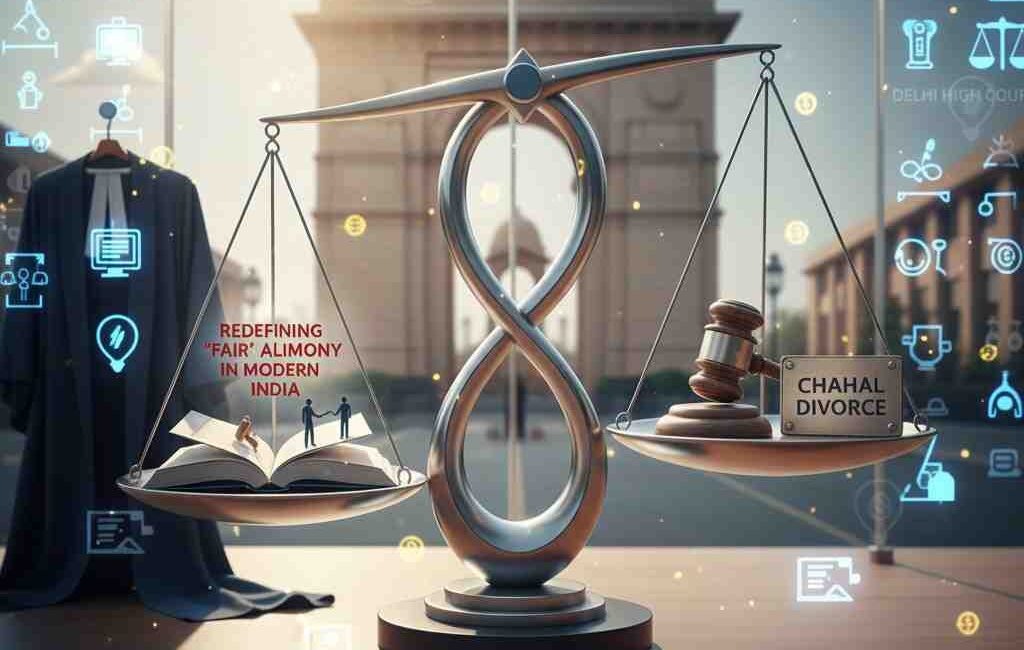A recent Delhi High Court judgment and Yuzvendra Chahal’s high-profile divorce have reignited the national debate on what “fair” alimony means in today’s India. Here’s how changing gender roles, financial independence, and evolving court interpretations are reshaping matrimonial law
The Changing Face of Matrimonial Justice
Marriage in India has long carried both emotional and financial obligations. Traditionally, alimony was seen as a husband’s duty to support his wife after separation. But with more women working, owning property, and earning equally or more than their spouses, the meaning of fair support is shifting. The Delhi High Court’s recent interpretation of alimony laws—and the public attention drawn by the Chahal divorce—have made this change impossible to ignore.
Across courts, judges are now asking deeper questions: Is alimony meant to maintain someone, compensate for lost opportunities, or equalise lifestyles? The answers are increasingly nuanced and depend on the realities of each marriage.
The Delhi High Court’s Stand: Need Over Entitlement
The Delhi High Court has recently clarified that alimony is not an automatic right. Instead, it’s a safeguard to prevent financial hardship after divorce. The court observed that if a spouse is educated, employable, and capable of sustaining themselves, they cannot expect lifelong financial support from the other. This signals a clear move away from entitlement and toward need-based justice.
At the same time, the Court recognised that real-world circumstances matter. If a spouse left a career to care for children or support a partner’s professional growth, that contribution deserves recognition. In such cases, maintenance isn’t charity—it’s a form of compensation for personal and economic sacrifices made during the marriage.
This balance between independence and equity lies at the heart of the new judicial approach. Courts want to ensure that no one is reduced to financial vulnerability, but they are equally careful not to penalise a working spouse solely for earning more.
The Chahal Divorce: Spotlight on Celebrity Settlements
Cricketer Yuzvendra Chahal’s separation from influencer Dhanashree Verma turned into a national talking point when reports of a large alimony settlement surfaced. Regardless of the figures’ accuracy, the media frenzy highlighted a deeper social divide. Many questioned why a financially independent woman should receive a hefty payout, while others argued that emotional and professional contributions within marriage deserve fair compensation.
This conversation mirrored the same principles discussed in courtrooms—what counts as fair when both partners have their own income and identity? The Chahal case, though private, amplified public awareness about how alimony is evolving from a one-sided obligation to a context-driven financial arrangement.
What Lawyers and Couples Should Note
- Purpose of Alimony:
The focus has shifted from equalising lifestyles to ensuring a dignified standard of living for the dependent spouse. Lawyers must build arguments around genuine need rather than assumed entitlement. - Earning Capacity and Effort:
Courts now assess not only what a person earns but also what they could earn based on education and experience. A capable spouse who chooses not to work may find it harder to claim maintenance. - Caregiving and Career Breaks:
Taking time off work for child-care or family duties is recognised as a legitimate reason for financial support. The courts view caregiving as a shared responsibility that can influence alimony outcomes. - Short Marriages and Independent Incomes:
In brief marriages without children or shared assets, significant alimony awards are becoming rare. The trend favours short-term or one-time settlements rather than long-term maintenance. - Pre-Marital and Separation Agreements:
As expectations evolve, more couples are formalising financial terms before or during marriage. Well-drafted agreements can prevent disputes and clarify what each partner considers “fair.”
The Bigger Picture: From Dependency to Dignity
India’s approach to alimony is clearly in transition. The modern spouse—regardless of gender—is expected to be financially aware and self-reliant. Yet, the courts continue to uphold the principle that no one should face economic ruin after a failed marriage.
The Delhi High Court’s reasoning, coupled with the Chahal case’s public visibility, reflects a society redefining fairness through the lens of equality and accountability. In this new landscape, alimony is not about reward or revenge—it’s about respect and reason.
FAQs on Fair Alimony and the Delhi High Court Ruling
What did the Delhi High Court recently rule about alimony?
The Delhi High Court clarified that alimony is not an automatic right. It should be awarded only when a spouse is genuinely in financial need and cannot maintain a reasonable standard of living. If both partners are educated and financially independent, permanent alimony may not be justified.
What is the difference between maintenance and alimony?
Maintenance refers to financial support provided during the marriage or while divorce proceedings are ongoing. Alimony, on the other hand, usually refers to a one-time or long-term payment made after the divorce is finalised. Both aim to ensure financial stability, but alimony is often more permanent.
Does the court consider earning potential when deciding alimony?
Yes. Courts now assess not only what a spouse currently earns but also what they are capable of earning based on education, qualifications, and work experience. A spouse who chooses to remain unemployed despite having the ability to work may receive reduced or no alimony.
How did the Yuzvendra Chahal divorce spark debate on alimony?
The high-profile divorce of cricketer Yuzvendra Chahal and influencer Dhanashree Verma gained attention due to reports of a large settlement amount. It reignited public debate about whether alimony should be based on need, equality, or compensation—especially in marriages where both partners are financially independent.
Are men also entitled to alimony in India?
Yes. The law is gender-neutral. Although traditionally women sought maintenance, courts have ruled that a husband can claim alimony if he is financially dependent and the wife has significantly higher income or assets.

























